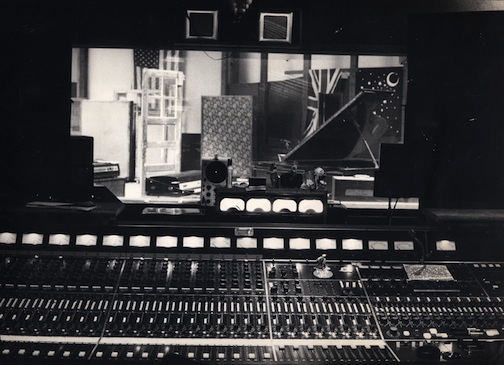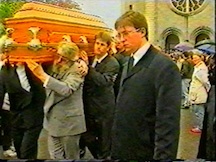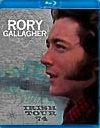May 21 2011
Rory Days: An interview with Robin Sylvester — Part 5
Robin Sylvester, bass player for Bob Weir’s RatDog, has been a fixture of the San Francisco music scene for so many years that one might understandably forget his substantial musical accomplishments in his own native England. In the late sixties, as the British Blues explosion rocked the pubs, clubs and concert halls of London Town, Robin was one of those lucky sods who witnessed it all, and much like his American counterparts who descended upon Yasgur’s farm in the summer of ’69, he can legitimately point to those heady times and say, “Yes, I was there!”
Born in 1950 Post War London, Robin spent much of his youth singing with the London Boy Singers, a professional boys’ choir patronized by distinguished composer Benjamin Britten. The choir performed regularly at Covent Gardens, and even made an album of Christmas music at famed Abbey Road Studios. Although now primarily known as a bass player, Robin also plays keyboard and guitar. By the time he turned 15 he was playing double bass in a Jazz band called, the David Lund Trio, and then later, the folk-rock band ORA. In 1969 he started working as chief engineer at London’s Tangerine Studios, and for the next 5 years worked closely with some of the finest up and coming Jazz, Progressive Rock, and Blues bands of Great Britain — none finer, at least in this writer’s view, than Ireland’s favorite son, Rory Gallagher.
Recently, I had a chance to ask Robin about those heady times in London where he witnessed first hand the great British Blues & Rock explosion — attending incredible shows at famed nightspots like the London Marquee, and recording aspiring musicians at Tangerine Studios. On the Fifth and final part of this interview, Robin talks about working on Rory Gallagher’s ill-fated San Francisco Sessions, and some final remarks on Rory’s legacy. You can read the previous parts of the interview here: Part 1 | Part 2 | Part 3 | Part 4
Part Five: San Francisco Sessions
Shadowplays: After the album, Against the Grain, there was a big push by Chrysalis to have Rory produced by someone other than Rory himself, something that hadn’t been done since his Taste days. For his next album, “Calling Card” he chose Roger Glover of Deep Purple to produce, and that proved problematical, eventually remixing first with Elliot Mazer and when that didn’t work out, Chris Kimsey lent a hand. You weren’t involved with this album I don’t think, but you did get involved in the next album of Rory’s, at least the next attempt at an album, the ill-fated San Francisco sessions. Elliot Mazer was slated to produce this album. How did you get involved with this project? What were you doing at the time? Were you still in New York?
Robin Sylvester: My band, The Movies, had moved to L.A., and after a wild year-long soap-opera had broken up. That’s a whole separate novel! Rory passed through town at some point, visited a session I was engineering (back to that!) and we had dinner at a Mexican restaurant in Hollywood. My room-mate played a trick and told the restaurant it was Rory’s birthday, and he was serenaded in Spanish by the waiters, – much to his embarrassment, though we laughed about it a lot later!! Next thing I knew, Elliot called and asked if I’d come and scope things out in San Francisco.
Shadowplays: I understand Elliot Mazer was having a problem with the mixes? What was going wrong? Elliot says that once you got there things got better. According to Gerry McAvoy’s book, “Riding Shotgun” there had developed some tension in the band, seemingly divided into two camps: Rod and Lou, Rory and Gerry. Did you see any of that? Was that part of the problem? This seemed a turning point for Rory.
Robin Sylvester: We got straight down to mixing; slapped a tape on and I just did what felt right. There was something odd about the tracks, and it wasn’t Rory. I’m not even really sure it was the sound. Maybe the tension of which you speak was affecting the music subtly, but I was not aware of any of that at the time. As so often, it was just Rory and Donal, encouraging me and asking for a touch more bass on the guitar.
We did have trouble mixing it. Rory had suggested that his friend Robin Sylvester could help. We flew Robin to SF and we mixed. It was fun. Robin is a musician and he approaches the studio as a musician, not a technocrat. I prefer working with Engineers that are Musicians. Robin fits that bill and was a pleasure to work with. Everybody seemed pleased as did folks from Chrysalis.” — Elliot Mazer

Shadowplays: Rory had second thoughts however and eventually scrapped the album entirely, dismantled the band, flew back to England and then later recorded the whole album again with sole remaining member of the band,Gerry McAvoy, and newly hired drummer Ted Mckenna. The album was recorded at Dierks Studio with the help of Alan O’Duffy.
The immediate thing is that I just want to get back to the bare brass knuckles of the sound. I’m going back to a three-piece for a while and if that sounds good, I’ll stay with it. There’s so much that I do guitar-style wise that can stand up in a three-piece because I play a cross between lead and rhythm and because of the acoustic knowledge I have. So far at rehearsals it’s sounded great with just three, so I’ll probably start the album on that basis and then just overdub myself on rhythm – or someone else. That’s more my thinking – getting away from the multi-layered sound. Going down to the bare bones. I’ve scrapped a lot of the songs – kept a couple of the ultra-hot ones – and added a few new ones. — Rory Gallagher

Shadowplays: In interviews later, former band mates Rod and Lou thought the album recorded at His Master’s Wheels in San Francisco was very good. Rory mentioned in a later interview that much of the album recorded at his Master’s Wheels could eventually see the light of day. Almost 35 years later it looks like that day has arrived. This month they are releasing a re-mixed version of that binned album with special bonus tracks and live performances of the Rory Gallagher Band at the Old Waldorf in 1979.
Robin Sylvester: The few days mixing in San Francisco in 1978 are a bit of a blur. I was living in LA, working as a bass player and trying to keep all my commitments. Elliott Mazer and his family looked after me well, and I fell in love with San Francisco again.
When I arrived there I found Rory struggling a bit with what they had. I think Elliott was also trying to figure out what Rory was hearing in his mind. And I just did my usual thing, – going through the tracks one by one, making my own “comps” of vocals and guitars, and mixing without doing anything too radical – standard practice in an unfamiliar room. “Wheels Within Wheels” (on the Best Of cd) is strange: some elements sound the same as my SF mix, yet it seems to be completely different!! I am most curious to hear the new release
Shadowplays: Was that the last time you worked with Rory? Did you keep track of his album releases, etc? Did you get a chance to see him during his U.S. tours from 78-91?
Robin Sylvester: We spoke occasionally for a few years, and then lost touch. I was unable to catch him when he was in town in the 80’s, but of course I always assumed there’d be another tour before too long . . .
I can’t say I really kept track, – it seemed so long between releases; but I picked up anything new when I saw it.

Shadowplays: Yes, his album production decreased dramatically, from putting out an album every year in the 70’s to taking 2 to 3 to almost 5 years before we’d get to hear a new Rory Gallagher album. He also toured less and less. In the mid-80’s he stopped touring in America altogether, not returning until his final U.S. tour in ’91. And unfortunately this was well before the internet had really blossomed, so a fan might not even know Rory had returned and was playing in a nearby town.
How did you hear about Rory’s passing? Where were you and what were you doing? Had you known he was ill?
Robin Sylvester: I was at home in San Francisco and and old friend from London called to tell me. I had no idea of his illness prior to that. I was not engineering much around that time except for friends, and was dragging my feet as far as learning the new developing computer technology. Around then I was playing bass or guitar with a lot of people.
Shadowplays: Session work or were you doing live gigs?
Robin Sylvester: At that specific time (’95) I was doing a bit of everything. A lot of “golden oldies” like Del Shannon, Billy Preston, Marvellettes, Peter Noone. The “golden oldies” were of course live, – Santa Cruz Boardwalk, County Fairs and so on. My resume of that stuff is quite amazing. Includes several loopy Chuck Berry shows, both fake and real Drifters and Coasters, Mary Wells, Percy Sledge and the great Sam Moore (Sam & Dave). But that’s a whole different chapter of my life! I always wished Rory could have caught me on a guitar gig!

Shadowplays: It was unfortunate that he passed away so young, yet he left us with an incredible catalogue of music. Lately his music has seen a bit of a renaissance, with Eagle Rock releasing some excellent compilations of his music, as well as DVD’s from his shows at the German Rockpalasts and the Swiss Montreux Festivals. There is also a new documentary on his life, “Ghost Blues” and a DVD release of his appearances on the German Beat Club. Tony Palmers’s Irish Tour ’74 documentary has just been released on Blu-Ray, and in a few days time those San Francisco sessions will be released along with a new live album. Rory Days seem upon us once again!
Irish poet Louis de Paor recently said that Rory died before the world could thank him for all he’d done. What is your best memories of Rory? What would you thank him for?
Robin Sylvester: The most difficult question last! I would thank him for the trust that he gave me. It is mostly thanks to him that I broke away from that sweat-box in Dalston and had the experience of working at many great studios of the day. I remember high spirits on a break when the 2 of us were mixing at Wessex studios: I don’t think he was drinking at the time, but I most certainly was . . . The whole band’s equipment was set up and we had a crazy time running from instrument to instrument doing impressions of people!! My impression of Lou Martin had him on the floor!! I remember him just plugging in and having that sound: my job was easy. I remember the Stratocaster was strung much heavier than I expected; he must have really had to work it. Through free-association I could probably go on for a while . . . but I must be putting you to sleep by now! Another round anyone?
Shadowplays: I could listen to Rory stories all night. I think something that is sometimes forgotten by his fans is what a great sense of humor Rory had, and from what I’ve read he wasn’t adverse to winding someone up. Gerry recalls that at Musicland Studios, Rory convinced him he should play the baseline of Calling Card with the pedals of Lou’s Hammond organ, so Gerry gets down on his hands and knees trying for a half hour to press the pedals down quick enough and Rory’s in tears laughing that Gerry took him seriously and was actually giving it a go. When you were doing your impressions, did you do a splayed leg impression of Gerry?
Robin Sylvester: Ha-ha! Yes, I did wicked impressions of everyone that day, including Rory himself doing the introductions!! My Frank Rossi (of Status Quo) had him in stitches too, I recall! Such silliness was good relief from the hours in the control room.
Shadowplays: After reading a few Rock ‘n Roll autobiographies, including the new Keith Richards drug-filled expose’, Rory seemed able to avoid many of the excesses that ensnared your typical “rock star” and yet he died at such an early age. According to his brother, Donal, a mixture of improperly prescribed medications and alcohol was the precipitating factor.
Robin Sylvester: A word about drinking. I have shown a very casual attitude towards drinking throughout this interview. That is how it was then: everyone drank, mostly beer, myself sometimes more than some others. Rory enjoyed a drink or two when I first knew him, but he normally went home before long with his guitar, leaving various band-members and myself to close the bar! Health problems eventually slowed us all down, and I am much luckier than Rory, obviously.
Shadowplays: I imagine life on the road can exact a heavy toll on one’s health, and Rory toured almost continuously for most of his life. And now Gary Moore has recently died! He was only 58. Another sad day for the Blues. And yet they’ve left us with a wealth of music…
Robin, thanks for taking the time to share some of your memories of Rory. You’ve experienced some incredible times both in England and here in the States, and it continues onward with your associations with the greater Dead family. Your recent gig with Bob Weir and the Marin Symphony was a smashing success, and I enjoyed watching you and Bob Weir & friends playing on a live internet broadcast from TRI Studios the other day. Thanks again for taking time out of your busy schedule to talk about Rory.
Robin Sylvester: You are very welcome; and thanks for unlocking so many lost times!
2 Responses to “Rory Days: An interview with Robin Sylvester — Part 5”

I have my late brother to thank for takeing me to see Rory at Middlesbrough Town Hall in the 70s.
Just recently i have been given this computor and it has opened up a whole new internet world for me.
I am playing the LPs of Rory Gallegher on my late brothers music centre and i only wish my brother had lived to use the computor.
I am trying to show younger people what a brilliant underated artist Rory was. Yours Sincerly P. Boiston Stockton on Tees
I found this article interesting, especially after some thoughts I published on Facebook a few days ago. You might be interested in my personal take on subjects mentioned here:
http://www.facebook.com/profile.php?id=100002042668556&sk=wall#!/notes/steven-leblanc/to-individualism/134898209921600
thank you for the article. I’ve been a fan of Rory since ’74 and I’m always interested in learning more about him.